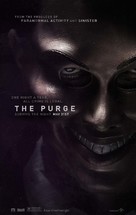Reviews provided by RottenTomatoes
Manohla Dargis, New York Times: The message just gets louder and louder, cruder and cruder, which is too bad because Mr. DeMonaco knows how to set a stage. Read more
Rex Reed, New York Observer: DeMonaco clearly hopes to make a significant moral statement on the level of Shirley Jackson's literary masterpiece The Lottery. Alas, his aim at political conservatives who support the gun lobby falls flat before he can pull the trigger. Read more
Claudia Puig, USA Today: Audiences will feel the need for a good cleansing after experiencing The Purge. Read more
Soren Anderson, Seattle Times: No real answers are provided by writer-director James DeMonaco. He simply presents this bizarre dystopian future, and the audience is left to take it or leave it. Read more
Leslie Felperin, Variety: That old horror-movie standard, a homestead besieged by psychos, gets remixed with a bit of Occupy-era class-conflict satire in the disappointing future-set thriller The Purge. Read more
Ignatiy Vishnevetsky, AV Club: The Purge suffers from BioShock Syndrome: Its survive-at-all-costs plot and anti-libertarian slant are incompatible. Read more
Kerry Lengel, Arizona Republic: "The Purge" is one of those unimaginative horror flicks that depend on skreeky music and sudden appearances to startle, but never actually frighten, the audience. Read more
Peter Keough, Boston Globe: Somewhere between Shirley Jackson's "The Lottery" and the "Family Guy" episode in which Peter Griffin joins the Tea Party lies "The Purge." Unfortunately, it's as funny as the former and as thoughtful as the latter. Read more
Chris Nashawaty, Entertainment Weekly: The Purge clearly has a lot on its mind, but it never really manages to express it. Read more
Matt Patches, Film.com: A blunt takedown of 1%-er politics masquerading as a home invasion picture. Read more
Neil Young, Hollywood Reporter: Gimmicky chiller lacks the robustness and distinction needed to support its social-commentary ambitions. Read more
Robert Abele, Los Angeles Times: A routine home invasion movie more interested in B-horror tropes and bloodletting than a thought-provoking look at "Hunger Games"-ish class warfare. Read more
Rene Rodriguez, Miami Herald: The film has some vague things to say about class and racial differences, but they are drowned out by the sounds of blasting shotguns and huge knives being plunged into chests. Read more
David Thomson, The New Republic: If The Purge is as far-sighted as Network proved to be, we are in for very ugly times. Read more
Rafer Guzman, Newsday: The vague posters for "The Purge" won't prepare you for how sharp and shockingly subversive this home-invasion flick can be. Read more
Stephen Whitty, Newark Star-Ledger: There's nothing you'd want to see again, particularly served up with all these shaky closeups and off-kilter angles and a cast mostly waiting - like us - for it to be over. Read more
Ian Buckwalter, NPR: The Purge is mostly a genre picture trying to layer on some prestige by way of social commentary. The latter falls flat; the film is actually stronger when it just goes for our baser instincts. Read more
Joe Neumaier, New York Daily News: You hope for a purge to wipe away bad movies like this. Read more
Lou Lumenick, New York Post: After a wickedly promising start, this pointed political satire quickly deteriorates into a fairly routine, if sporadically quite effective, home-invasion thriller. Read more
Michael Sragow, Orange County Register: Writer-director James DeMonaco's The Purge fritters away its promise in lurid, frenzied violence. Read more
Tirdad Derakhshani, Philadelphia Inquirer: In its own clumsy, exaggerated way, The Purge takes a strong stand against our cultural obsession with violence and our tendency to conflate justice with vengeance. Read more
James Berardinelli, ReelViews: When critics bemoan the dumbing down of movies, they're talking about stuff like The Purge. Read more
Simon Abrams, Chicago Sun-Times: Instead of being a creepy B-movie about the necessity of suppressing one's animalistic urges, "The Purge" is just a product of uninspired filmmaking. Read more
Peter Travers, Rolling Stone: Too bad the film devolves into a series of home-invasion cliches. The Purge was almost on to something. Read more
Kristin Tillotson, Minneapolis Star Tribune: Its premise requires more sophisticated layering for the audience to really get on board with the notion that people leading very comfortable lives will suddenly go on a murder bender just because they can. Read more
Kevin C. Johnson, St. Louis Post-Dispatch: The great premise in "The Purge" - and it is a great premise, while being no "Hunger Games" - is squandered on a few levels. Read more
Rick Groen, Globe and Mail: Fans, gear up for rock-em-sock-em action, yet don't be disappointed if much of the goonery seems a bit tepid and, dare I say, staged. Read more
Peter Howell, Toronto Star: It's cultural commentary as blunt instrument - and as blunt instruments are wont to do, it achieves an end while making a bloody mess. Read more
Nigel Floyd, Time Out: The film's would-be subversive ideas about the kneejerk appeal of social violence get lost in the mix. Read more
Peter Hartlaub, Hearst Newspapers: The blunt instrument plot allows for a few sneaky moments of satire and social commentary lite. Read more
Alan Scherstuhl, Village Voice: The set-up is arresting, the domestic scenes well observed and acted, and the payoffs involving that Roomba toy excellent. Also, a late-film twist isn't a surprise, exactly, but it is delicious. Read more
Bilge Ebiri, New York Magazine/Vulture: The Purge is not subtle. But why should it be? It's not a movie about class or morality, but about the need for violence -- our own. We are the audience, after all, and we must be purged, too. Read more
Michael O'Sullivan, Washington Post: A nutty if bloody lark, with a strange artificiality to the behaviors it portrays. That blunts the sharpness of any cultural critique it might aspire to. Read more

